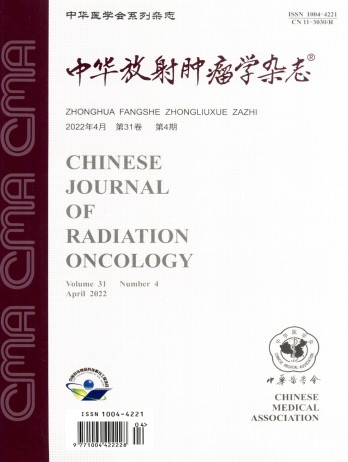The microdamage of " morphologically normal white matter" in patients with nasopharyngeal carcinoma after radiotherapy and its correlation with the irradiation dose
引用次数: 0
Abstract
Objective To explore the correlation between microdamage in white matter and radiotherapy dose at early stage after radiotherapy (RT) in patients with nasopharyngeal carcinoma (NPC). Methods Thirty-three patients who were initially diagnosed with NPC were recruited and received diffusion tensor imaging (DTI) scan and neuro-cognitive scale test within 1 week before RT and the first day after RT. DTI-related characteristic parameters including fractional anisotropy (FA), mean diffusivity (MD), axial diffusivity (λ‖), and radial diffusivity (λ⊥) were calculated based on whole-brain voxel analysis method. Paired t-test was conducted to evaluate statistical significance between pre-RT and post-RT groups. In the subgroup analysis, all the subjects were divided into 3 groups according to the average dose of temporal lobe, and each group was set with an equal dose interval range. The DTI-related parameters of whole brain pre-RT and post-RT in each group were statistically compared. All the statistical results were corrected by FDR with a threshold of P 100. Results FA, MD, λ‖ and λ⊥in the post-RT group significantly differed compared with those in the pre-RT group (P<0.05). The values of FA, MD, λ‖ and λ⊥were 0.455±0.016, (9.893±0.403)×10-4, (13.441±0.412)×10-4 and (8.231±0.429)×10-4, respectively. Subgroup analysis showed that the extent and degree of λ‖ and λ⊥ changes were exacerbated with the increase of the average dose of temporal lobe after RT. Particularly in high-dose group, the average dose range was 25-35 Gy and the extent of regions with significant changes was significantly larger than those in the medium-dose (15-25 Gy) and low-dose groups (5-15 Gy)(P<0.05). Conclusions DTI can be utilized to detect" normal" brain tissue microdamage in NPC patients at early stage after RT. The average radiation dose of temporal lobe may be one of the reasons for the severity of cerebral microdamage. In the future, DTI technique may be useful for guiding exposure dose of organs at risk during RT planning and to evaluate the cohort with a high risk of cerebral microdamage at early stage after RT, thereby protecting normal cerebral tissues to the maximum extent. Key words: Diffusion tensor imaging; Nasopharyngeal neoplasm/radiotherapy; Radiation-induced brain injury; Dosimetry鼻咽癌放疗后“形态正常白质”的微损伤及其与放疗剂量的相关性
目的探讨鼻咽癌放疗后早期白质微损伤与放疗剂量的相关性。方法对33例初次诊断为鼻咽癌的患者在放疗前1周和放疗后第1天进行弥散张量成像(DTI)扫描和神经认知量表测试,基于全脑体素分析方法计算径向扩散率(λõ)。进行配对t检验以评估RT前组和RT后组之间的统计学显著性。在亚组分析中,根据颞叶的平均剂量将所有受试者分为3组,每组设定相等的剂量间隔范围。对各组RT前后全脑DTI相关参数进行统计学比较。所有统计结果均通过FDR进行校正,阈值为P100。结果放疗后组FA、MD、λ‖和λõ与放疗前组比较有显著性差异(P<0.05),FA值分别为0.455±0.016、9.893±0.403×10-4、13.441±0.412×10-4和8.231±0.429×10-4。亚组分析表明,随着RT后颞叶平均剂量的增加,平均剂量范围为25~35Gy,有显著变化的区域明显大于中剂量组(15~25Gy)和低剂量组(5~15Gy)(P<0.05)。颞叶的平均辐射剂量可能是脑微损伤严重的原因之一。未来,DTI技术可能有助于在RT计划期间指导风险器官的暴露剂量,并在RT后的早期评估大脑微损伤风险较高的队列,从而最大限度地保护正常脑组织。关键词:扩散张量成像;鼻咽肿瘤/放射治疗;放射性脑损伤;剂量测定法
本文章由计算机程序翻译,如有差异,请以英文原文为准。
求助全文
约1分钟内获得全文
求助全文
来源期刊
自引率
0.00%
发文量
6375
期刊介绍:
The Chinese Journal of Radiation Oncology is a national academic journal sponsored by the Chinese Medical Association. It was founded in 1992 and the title was written by Chen Minzhang, the former Minister of Health. Its predecessor was the Chinese Journal of Radiation Oncology, which was founded in 1987. The journal is an authoritative journal in the field of radiation oncology in my country. It focuses on clinical tumor radiotherapy, tumor radiation physics, tumor radiation biology, and thermal therapy. Its main readers are middle and senior clinical doctors and scientific researchers. It is now a monthly journal with a large 16-page format and 80 pages of text. For many years, it has adhered to the principle of combining theory with practice and combining improvement with popularization. It now has columns such as monographs, head and neck tumors (monographs), chest tumors (monographs), abdominal tumors (monographs), physics, technology, biology (monographs), reviews, and investigations and research.

 求助内容:
求助内容: 应助结果提醒方式:
应助结果提醒方式:


